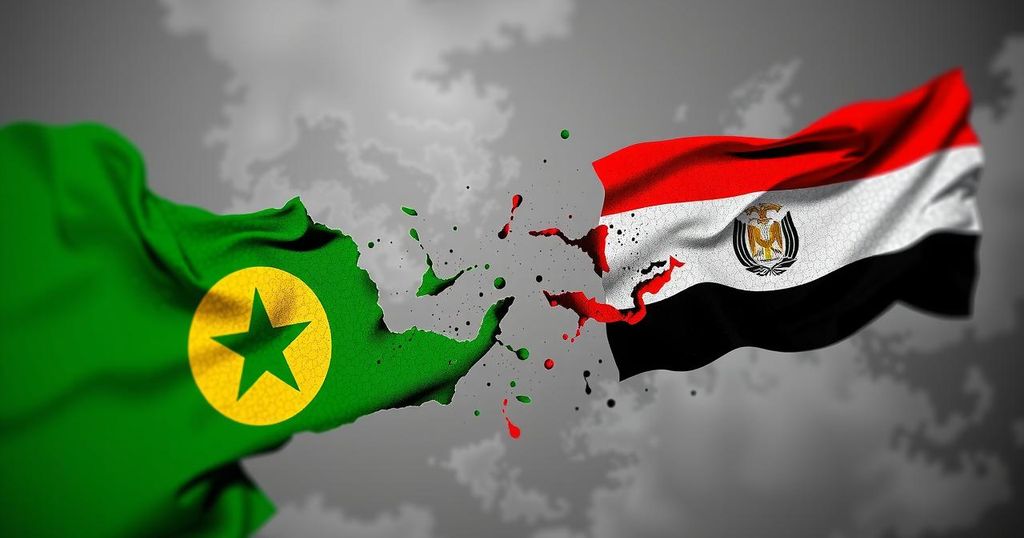Somalia’s Defense Pact with Egypt: A Threat to Stability and Security Against al-Shabaab
Somalia’s defense pact with Egypt jeopardizes security efforts against al-Shabaab, complicating relations with Ethiopia, a key military partner. Intra-Somali divisions and rising jihadist threats could destabilize the region further. Urgent EU mediation is necessary to prevent escalation and foster a coordinated response to the growing risks posed by al-Shabaab.
Somalia’s recent defense agreement with Egypt has provoked anger in Ethiopia, complicating coalition efforts to combat al-Shabaab, the jihadist group focused on overthrowing Somalia’s government. Following a mortar attack in Mogadishu, which resulted in casualties and was claimed by al-Shabaab, the precarious situation for Somali security has reemerged, as the group continues its violent campaign. Despite some military advances made by Somalia against al-Shabaab, the jihadists still control significant regions in the south and central parts of the nation. The new Egypt-Somalia pact poses a grave threat to the political stability necessary for Somalia to launch a united front against al-Shabaab. It could precipitate a deterioration in relations between Somalia and Ethiopia, the latter being a major military contributor to the African Union peacekeeping mission, ATMIS. The defense agreement is perceived as a challenge to Ethiopian influence, further aggravating hostilities and risk inciting conflict between Somali clans which could favor al-Shabaab’s agenda. As Ethiopia’s military presence has been pivotal in holding territory from al-Shabaab, the potential sidelining of Ethiopian troops could hinder the viability of the ATMIS mandate set to expire at the end of the year. Additionally, growing divisions within Somalia regarding the acceptance of Ethiopian troops have been compounded by regional disputes, especially in states like Jubaland and South West, which rely heavily on Ethiopian military support. These complications undermine efforts at cohesive governance and security, leaving Somalia vulnerable. The implications extend beyond Somalia, threatening regional stability in the Horn of Africa and the Red Sea. A strengthened al-Shabaab could encourage arms trafficking, piracy, and the proliferation of Islamist militancy, triggering broader security concerns for European partners invested in the stability of the region. Notably, a more potent al-Shabaab could destabilize Kenya, already facing threats from the jihadists, with adverse impacts on European investments and humanitarian missions. The European Union, a significant stakeholder in Somalia, is urged to take a proactive role in mediating tensions between Egypt and Ethiopia. Collaborative efforts with Italy and the United Kingdom are paramount to alleviating tensions and maintaining support for the AU mission. Furthermore, the EU should seek to engage influential partners such as Turkey and the UAE, who could facilitate dialogue to mitigate potential conflicts arising from the Egypt-Somalia agreement. This coordinated approach is critical to safeguarding international investments and resisting the exploitation of Somalia’s fractured political landscape by extremist groups.
The political atmosphere in Somalia has been characterized by persistent conflict with al-Shabaab, a militant group that has engaged in violent campaigns aimed at destabilizing the federal government. In light of Somalia’s current defense pact with Egypt, tensions have intensified with neighboring Ethiopia, complicating the already fragile security dynamics in the region. Ethiopia plays a crucial role in the African Union peacekeeping mission that assists Somalia. Any agreements that provoke Ethiopia threaten both regional cooperation and the stability necessary for effective counterterrorism operations against al-Shabaab. International actors, particularly the European Union, have significant investments in Somali security efforts and face pressure to mediate these tensions to avoid a power vacuum that could benefit extremist groups.
In conclusion, the recent defense pact between Somalia and Egypt poses significant risks to the ongoing efforts to combat al-Shabaab and maintain regional stability. Ethiopia’s critical military engagement in Somalia cannot be understated, and sidelining Ethiopian troops could lead to a security vacuum that the jihadists would exploit. The European Union, along with its partners, must urgently coordinate mediation efforts to alleviate tensions between Cairo and Addis Ababa. A collaborative diplomatic initiative is essential to safeguard not only Somalia’s security but also the broader stability of the Horn of Africa and mitigate the risk of an expanded al-Shabaab influence.
Original Source: ecfr.eu




Post Comment